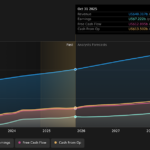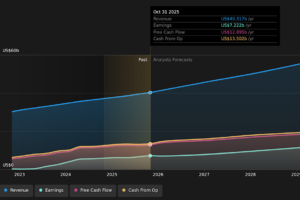<p class="canvas-atom canvas-text Mb(1.0em) Mb(0)–sm Mt(0.8em)–sm" type="text" content="Facebook (NASDAQ: FB) has changed a lot over the last five years. The social networking giant has ramped up Instagram, the popular photo-sharing app it acquired in 2012, but struggled to monetize WhatsApp, the messaging app, and Oculus, the virtual-reality device maker, both of which it acquired in 2014. ” data-reactid=”11″>Facebook (NASDAQ: FB) has changed a lot over the last five years. The social networking giant has ramped up Instagram, the popular photo-sharing app it acquired in 2012, but struggled to monetize WhatsApp, the messaging app, and Oculus, the virtual-reality device maker, both of which it acquired in 2014.
Meanwhile, the company has seen explosive growth in revenue and profits, and its stock has tripled. The company has successfully transitioned to mobile, and weathered a wave of privacy-related scandals, including the Cambridge Analytica incident and a broader backlash against the company.
What will the next five years hold for the social network? No one knows for sure, but the company has already given investors a road map, promising to focus on privacy, and areas like its marketplace, video, payments and dating. And Instagram’s strong growth is likely to continue. Let’s take a closer at what Facebook might look like in 2024.


Image source: Facebook.
<h2 class="canvas-atom canvas-text Mb(1.0em) Mb(0)–sm Mt(0.8em)–sm" type="text" content="A more powerful Instagram” data-reactid=”26″>A more powerful Instagram
Instagram has long been the ace up Facebook’s sleeve. While the core Facebook brand has been dragged through the mud and lost trust with the public, Instagram has escaped much of that scrutiny. Many users who delete their Facebook profile still use Instagram, meaning they are just as much a part of Facebook’s universe.
Instagram’s massive growth is also likely to continue. Facebook announced last June that the platform had reached 1 billion monthly users, doubling in just two years. Instagram Stories, meanwhile, crossed 500 million daily users earlier this year. Instagram has stopped making an announcement every time it adds another 100 million users to its user base, but it seems reasonable that the app could add another 500 million users over two years, and reach at least 2 billion by 2024, double from where it was last year.
<p class="canvas-atom canvas-text Mb(1.0em) Mb(0)–sm Mt(0.8em)–sm" type="text" content="Instagram appears to currently be the main driver of ad impression growth at Facebook, though Stories ads aren't yet monetizing at the same rate as News Feed ads as marketers haven't fully adjusted to the new platform, as COO Sheryl Sandberg explained on the recent earnings call. That should change over the next five years — especially as Stories, a video medium, could be more valuable to advertisers than News Feed ads are now. ” data-reactid=”29″>Instagram appears to currently be the main driver of ad impression growth at Facebook, though Stories ads aren’t yet monetizing at the same rate as News Feed ads as marketers haven’t fully adjusted to the new platform, as COO Sheryl Sandberg explained on the recent earnings call. That should change over the next five years — especially as Stories, a video medium, could be more valuable to advertisers than News Feed ads are now.
<p class="canvas-atom canvas-text Mb(1.0em) Mb(0)–sm Mt(0.8em)–sm" type="text" content="It's hard to quantify Instagram's impact as Facebook doesn't break out business metrics for the app, but the site is likely to be a major driver of Facebook's revenue growth as more users join the platform and ad rates for Stories and things like IGTV increase as marketers move to the new channels. In addition, Instagram has just begun experimenting with direct e-commerce, which could also have explosive potential.” data-reactid=”30″>It’s hard to quantify Instagram’s impact as Facebook doesn’t break out business metrics for the app, but the site is likely to be a major driver of Facebook’s revenue growth as more users join the platform and ad rates for Stories and things like IGTV increase as marketers move to the new channels. In addition, Instagram has just begun experimenting with direct e-commerce, which could also have explosive potential.
<h2 class="canvas-atom canvas-text Mb(1.0em) Mb(0)–sm Mt(0.8em)–sm" type="text" content="A changing Facebook” data-reactid=”31″>A changing Facebook
Facebook’s namesake site is also undergoing some significant changes. In a blog post earlier this year and again in Facebook’s first-quarter earnings call and its recent F8 conference, Zuckerberg underscored the company’s push into privacy, including a focus on encrypted messaging, and an emphasis on products like Groups that stress private spaces over public sharing.
<p class="canvas-atom canvas-text Mb(1.0em) Mb(0)–sm Mt(0.8em)–sm" type="text" content="At the same time, Facebook is also developing new products like Marketplace, Facebook Watch, Payments and Dating that have the power to make Facebook much more than what it is today, as those respectively compete directly with Craigslist and EBay, YouTube, PayPal and Match Group, businesses that represent hundreds of billions in market value. With a network of more than 2 billion users, Facebook can easily push into new businesses, and diversifying beyond advertising would be a wise move as it would limit its risk and give users another reason to engage with its platform.” data-reactid=”33″>At the same time, Facebook is also developing new products like Marketplace, Facebook Watch, Payments and Dating that have the power to make Facebook much more than what it is today, as those respectively compete directly with Craigslist and EBay, YouTube, PayPal and Match Group, businesses that represent hundreds of billions in market value. With a network of more than 2 billion users, Facebook can easily push into new businesses, and diversifying beyond advertising would be a wise move as it would limit its risk and give users another reason to engage with its platform.
Facebook acknowledges that these changes will initially weigh on margins and slow down revenue growth, but after last year’s backlash it’s imperative that the company get privacy right — carelessness with personal data has already damaged its reputation, and has the potential to drive more users away or cut down engagement with the site.
Five years from now, Facebook will be more focused on private interactions, and will likely have new products that aren’t even on the radar yet. That should create more opportunities for monetization, and increasing usage will help grow its advertising base.
<h2 class="canvas-atom canvas-text Mb(1.0em) Mb(0)–sm Mt(0.8em)–sm" type="text" content="What about WhatsApp and Oculus? ” data-reactid=”40″>What about WhatsApp and Oculus?
<p class="canvas-atom canvas-text Mb(1.0em) Mb(0)–sm Mt(0.8em)–sm" type="text" content="After paying $19 billion for WhatsApp in 2014, an enormous sum for a business whose only revenue stream was a $1/year subscription, Facebook finally took steps to begin monetizing the messaging app last year with ads on WhatsApp Stories and a WhatsApp Business app where businesses pay to be connected with customers.” data-reactid=”41″>After paying $19 billion for WhatsApp in 2014, an enormous sum for a business whose only revenue stream was a $1/year subscription, Facebook finally took steps to begin monetizing the messaging app last year with ads on WhatsApp Stories and a WhatsApp Business app where businesses pay to be connected with customers.
Facebook has struggled to monetize both WhatsApp and Messenger, but these initial steps to extract value from the messaging services are encouraging. WhatsApp has also experimented with a peer-to-peer payment service in India, much like Venmo, and Facebook is also aiming to integrate the messaging platform with Facebook’s other sites so users can send messages from, say, Instagram to WhatsApp. With its audience of 1.5 billion users, WhatsApp presents a huge opportunity for Facebook, but how the company taps into that remains a question mark.
<p class="canvas-atom canvas-text Mb(1.0em) Mb(0)–sm Mt(0.8em)–sm" type="text" content="Similarly, Oculus's business contribution has also been minimal thus far, though 2019 could represent a breakthrough year for the VR device: Superdata, a market research firm, predicted 1.3 million units of the new Quest device would be sold, bringing in more than $500 million in sales at a retail price of $399. That same firm sees VR growing to a $16.3 billion business in 2022 from $3.6 billion last year. Thus far, predictions about virtual reality have proven overenthusiastic, but the technology could hit a tipping point in the next five years. If that happens, Facebook is sure to benefit.” data-reactid=”43″>Similarly, Oculus’s business contribution has also been minimal thus far, though 2019 could represent a breakthrough year for the VR device: Superdata, a market research firm, predicted 1.3 million units of the new Quest device would be sold, bringing in more than $500 million in sales at a retail price of $399. That same firm sees VR growing to a $16.3 billion business in 2022 from $3.6 billion last year. Thus far, predictions about virtual reality have proven overenthusiastic, but the technology could hit a tipping point in the next five years. If that happens, Facebook is sure to benefit.
With its current momentum, Facebook’s revenue is likely to have at least doubled over the next five year, driven by the expansion of Instagram and Stories, increasing engagement, and new Facebook products. In addition, WhatsApp and Oculus present investors with upside potential.
Facebook may be a much different company five years from now, but with the company’s dominance of social networking and the competitive advantages that that presents, it’s likely to be in a stronger position with an even larger user base in 2024 than it is today, and that should be good news for investors.
<p class="canvas-atom canvas-text Mb(1.0em) Mb(0)–sm Mt(0.8em)–sm" type="text" content=" More From The Motley Fool ” data-reactid=”46″> More From The Motley Fool
<p class="canvas-atom canvas-text Mb(1.0em) Mb(0)–sm Mt(0.8em)–sm" type="text" content="Randi Zuckerberg, a former director of market development and spokeswoman for Facebook and sister to its CEO, Mark Zuckerberg, is a member of The Motley Fool’s board of directors. Jeremy Bowman owns shares of Facebook. The Motley Fool owns shares of and recommends Facebook. The Motley Fool has a disclosure policy.” data-reactid=”55″>Randi Zuckerberg, a former director of market development and spokeswoman for Facebook and sister to its CEO, Mark Zuckerberg, is a member of The Motley Fool’s board of directors. Jeremy Bowman owns shares of Facebook. The Motley Fool owns shares of and recommends Facebook. The Motley Fool has a disclosure policy.













